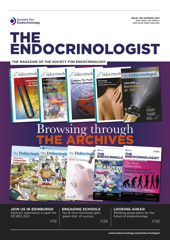I started with good intentions. I wanted to be a doctor: someone who could make people better or, at least, prevent them getting worse.
It was 3 years of clinical training before I qualified in medicine, followed by several standard junior hospital posts over 4 years. I now felt confident that I could take a medical history, perform a general medical examination, postulate a reasonable differential diagnosis, and suggest some of the more pertinent investigations. I had also chosen to pursue a career in hospital medicine rather than general practice. I was proud that I had acquired and developed my clinical skills and, at this point, made the crucial decision to specialise in endocrinology.
I entered the specialty as a research fellow and progressed to become a consultant. Henceforth there was a trade-off. As fast as I learnt about endocrinology, my general medical skills atrophied. It was inevitable and predictable; there were no more attempts to listen to or interpret heart murmurs, whispering pectoriloquy disappeared soundlessly, and rectal examination remained left behind forever. The path was inexorable. Stethoscope now gathering dust, my sole companion in the clinic was my orchidometer.
Over the subsequent 30 years, I remained research-active, associated with an even greater focus on one gland, the pituitary, as opposed to the whole endocrine system. If truth be told, I now even had a favourite hormone. In fairness, it could have been worse, my interests might have been reduced to a sub-unit rather than a whole hormone. The process of deskilling over this time period was relentless; I was aware of the loss of my general medical skills, and a little sad at being confined to so narrow a field as the actions of a single hormone.
Salvation and greater self-respect came from an unlikely source. In retirement I had discovered the existence of ResearchGate, a commercial social networking site for scientists and researchers. I soon realised that it knows an enormous amount, if not everything, about my own research publication history and that of everyone else. In any one week it tells me how many citations or reads of my research publications have occurred, and whether or not the reads are in Bolivia, USA, Japan or anywhere.
What really appealed to me about ResearchGate, however, was the ‘Jobs you may be interested in’ section. After all, ResearchGate knows all my research publication history (even down to book reviews written 30 years ago) and yet, currently, it recommends that I consider applying for a post in CNS/psychiatry, or inflammation, or as group leader in translocation of complex macromolecules across the intestinal epithelial barrier, or translational cardiology, or lung therapeutics, or gynaecology, or microbiome dynamics, or translational kidney physiology, or, even, plant metabolism. What an all-rounder ResearchGate considers me to be!
OK, none of these posts require my whispering pectoriloquy detection gene to be reawakened but, with the support of ResearchGate, no longer do I consider myself a one-trick pony. In a time of crisis, ResearchGate has been good for my mental health.
‘HOTSPUR’





